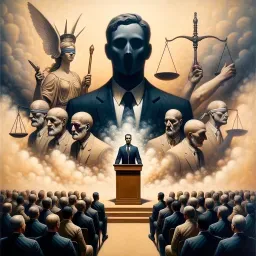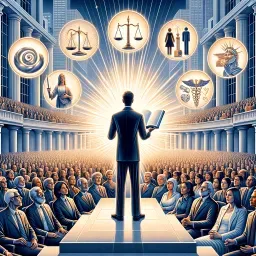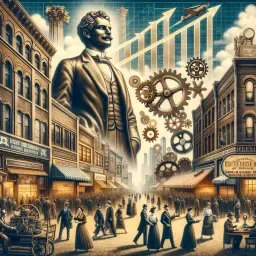”Yesterday is not ours to recover,
but tomorrow is ours to win or lose“

0
0
0
0
- Meaning
- This phrase underscores the importance of focusing on the future rather than dwelling on the past. It stresses that while we cannot change what has already happened ("Yesterday is not ours to recover"), we have the power to influence what is yet to come ("tomorrow is ours to win or lose"). This aphorism serves as a motivational reminder that our actions and decisions today shape our future.
- Allegory
- The sunrise in the image represents a new beginning, a fresh start each day brings. The figure standing on the hill symbolizes an individual ready to take on the challenges and opportunities of the future with determination. The shadows of past events behind the figure signify the unchangeable nature of yesterday, fading into the background as insignificant compared to the vibrant and open possibilities ahead. This represents the motivational message that while the past cannot be altered, the future is shaped by the actions and choices we make today, resonating with hope and empowerment.
- Applicability
- This phrase encourages individuals to concentrate on their future actions rather than lamenting past mistakes. It turns the spotlight on personal responsibility, suggesting that the outcome of tomorrow depends on our choices and efforts today. Whether in the context of personal development, career ambitions, or relational goals, the message is simple: look ahead and take proactive steps to create the future you desire.
- Impact
- This phrase has had a considerable impact on motivational speaking and literature. It is often used to inspire people to take control of their futures, emphasizing personal empowerment and proactive behavior. The phrase is a staple in self-help contexts, educational settings, and leadership programs, where it serves to inspire forward-thinking and continuous improvement.
- Historical Context
- The historical context of this phrase can be attributed to the era of Lyndon B. Johnson's presidency, which included significant events such as the Civil Rights Movement and the Vietnam War. Johnson's leadership was marked by efforts toward social reform, highlighted by his vision of the "Great Society" to eliminate poverty and racial injustice. Motivational messages like this one would have resonated during times when society faced tremendous change and individuals were called upon to contribute to a brighter future.
- Criticisms
- There are few significant criticisms of this phrase, given its largely positive and motivational nature. However, some might argue that it oversimplifies complex emotional and psychological processes related to overcoming past traumas or failures. Critics might say that while looking forward is important, it is also essential to process and heal from past experiences.
- Variations
- There are no widely known variations of this phrase, but its core message of focusing on the future and personal accountability is echoed across different cultures and sayings. For example, the Japanese proverb "Nana korobi ya oki" (Fall down seven times, stand up eight) also conveys a forward-looking resilience despite past failures.
-

I am not a crook.
-

Ask not what your country can do for you – ask what you can do for your country.
-

The only limit to our realization of tomorrow will be our doubts of today.
-

The only thing we have to fear is fear itself.
-

Do unto others as you would have them do unto you.
-

A public office is a public trust.
-

We must adjust to changing times and still hold to unchanging principles.
-

The buck stops here.
-

Our long national nightmare is over.
-

The business of America is business.
-

In the end, we will remember not the words of our enemies, but the silence of our friends.
No Comments